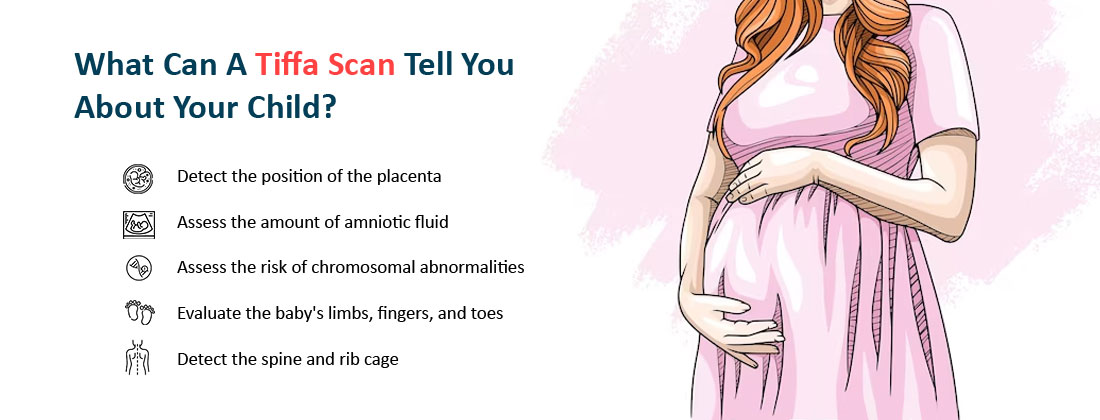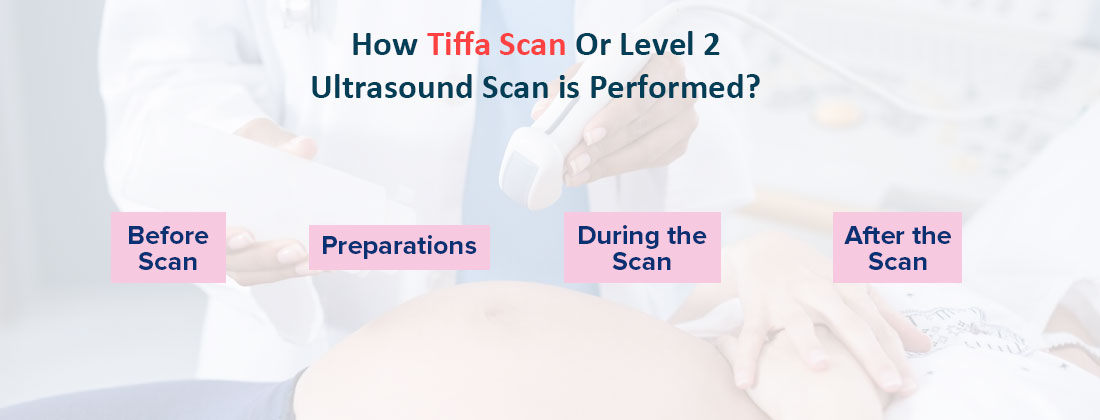
Tiffa scan is the most common type of ultrasound scan or ultrasound level II scan. During the second trimester or at 18-20 weeks this scan is done to detect the presence of major external and internal organs of the fetus and...
Tiffa scan is the most common type of ultrasound scan or ultrasound level II scan. During the second trimester or at 18-20 weeks this scan is done to detect the presence of major external and internal organs of the fetus and helps the doctor to check the development of the fetus. With the help of this scan, there is potential increase in the detection of fetal anomalies. This scan is safe for the baby as well as for the mother.
Having a child is an extremely amazing experience for a mother. This time is filled with a variety of feelings, mothers may feel nausea or sometimes they feel cravings. On the other hand, your doctor recommends you a variety of tests and ultrasound scans. Each of these tests has some importance in determining your baby’s appropriate development and function in your womb.
Tiffa scan offers a comprehensive image of the fetal anomaly, allowing doctors to detect the abnormalities or defects. In the case of twin pregnancy, a Tiffa scan becomes more important. In the case of twin pregnancy women and twins may have some complications like sharing of the amniotic sac or placenta, leading to specific complications such as Twin Twin Transfusion Syndrome (TTTS) or discrepancy in growth. These kinds of complications require close monitoring for the healthy development of both babies.
What is a Tiffa Scan?
Targeted Imaging for Fetal Anomalies (TIFFA), Fetal anomaly Scan or Level II Ultrasound scan. It is a detailed ultrasound examination that detects the structures and organs of each baby to identify any potential anomalies. Tiffa scan also evaluates the placentas and amniotic sacs in case of multiple pregnancies.
What Can a Tiffa Scan Tell You About Your Child?
Tiffa scan is done to assess the growth of a child and to rule out any structural malformations.

This scan is done to evaluate the following conditions:
- Detect the position of placenta
- Assess the amount of amniotic fluid
- Assess the risk of chromosomal abnormalities
- Tiffa scan analyses the shape of the body, face (detect the abnormalities like cleft lip or palate)
- Evaluates the brain size, shape and structure of the child to detect the brain problems.
- Detect the spine and rib cage to check for bone alignment and skin growth.
- Evaluates the baby's limbs, fingers and toes
- Determine the kidney structure and function at this time the child starts to urinate every half hour.
Tiffa Scan is Used Primarily to Rule Out Congenital Anomalies
- Congenital heart defects
- Spina bifida
- Anencephaly
- Down syndrome
TIFFA Scan can detect major kidney issues like abnormal or missing kidneys, a defective abdominal wall, a defective diaphragm and any limb abnormalities.
When is a TIFFA Scan Performed?
Generally, the majority of the babies are normal. But all women at any age have a chance of having a baby with structural abnormalities which may be physical or mental. To rule out these abnormalities in early stages TIFFA Scan is done. Therefore, it is important for every woman who is pregnant to have a fetal anomaly scan.
So, search for the best diagnostic centre nearby that offers Tiffa scan and inquire about TIFFA scan cost in Delhi or Tiffa scan cost nearby diagnostic centre for quick and safe testing.
How Tiffa Scan or Level II Ultrasound Scan is Performed?

Before Scan
Specific instruction are given before the scan and these are
Preparations
No specific preparation is required. But healthcare providers may ask the patient to fill their bladder before scan by drinking plenty of water. Full bladder is needed for a better visualisation of the womb during ultrasound
It is advisable to wear loose and comfortable clothes that allow easy access to the bare abdomen for scanning.
Should inform the doctor prior to the scanning if that woman is allergic from latex or any ultrasound gel.
Must inform your doctor about medications you are taking. Related queries should be discussed with your doctor whether you have to take that medication or not.
During the Scan
Tiffa scan includes the following steps:
Ultrasound gel is applied to the stomach.
To obtain the images ultrasound probe is used to apply the gel.
As the doctor takes the measurements and tries to view the fetus from different angles, the entire procedure will take at least thirty minutes.
You might be able to see parts of your baby, like their hands and face. There are some diagnostic centres that do not allow fathers to view their unborn children, others do.
After the Scan
Gel is removed with a sterile piece of cotton gauze. No aftercare is required after the scan as TIFFA scan is a non-invasive and safe procedure.
What Happens if the Tiffa Scan Report is Not Normal?
If a TIFFA (Targeted Imaging for fetal Anomalies) scan reports abnormalities or issues. It is essential to consult with a qualified doctor, they can provide further insights into the findings, discuss potential implications and guide you through appropriate next steps or necessary interventions. There have also been accounts of pregnancies in which foetuses had problems delivering a healthy, normal baby. Therefore, if an issue is found, do not become alarmed or distraught. Prior to making a decision, we strongly advise that you speak with your obstetrician. The last say in the matter is yours alone.
Conclusion
An anomaly scan also known as TIFFA Scan is a crucial diagnostic test that is done between 18-20 weeks of gestation. Journey of pregnancy is nine months long. It is one of the best and brightest times for mothers. This scan examines the baby's heartbeat as well as physical growth.
A great ultrasound experience is one of the many reasons to choose the best TIFFA scan centre near me to get regular ultrasound scans done to ensure a safe and healthy child.
Why Choose Ganesh Diagnostics for "CT Scans for Kidney Disease Diagnosis
Ganesh Diagnostics is a trusted name in the field of diagnostic imaging, renowned for its excellence in various diagnostic tests. Choosing Ganesh Diagnostics for your TIFFA scans offers several significant advantages:
State-Of-The-Art Imaging Technology And Equipment
Ganesh Diagnostics is equipped with state-of-the-art machines that deliver high-resolution images, ensuring accurate diagnosis and monitoring the growth of child and mothers health.
Experienced And Skilled Radiologists And Technicians
Our team comprises highly experienced radiologists and technicians who specialise in interpreting the obtained images. Their expertise ensures precise and reliable results.
24/7 Availability
At Ganesh Diagnostics, we understand the importance of convenience in healthcare. Our round-the-clock availability ensures that you can schedule your TIFFA scan at a time that suits you best.
Branches In 7 Areas Across Delhi For Easy Accessibility
Ganesh Diagnostics has branches conveniently located across Delhi, ensuring easy accessibility for patients quick and safety
For more details, contact us









